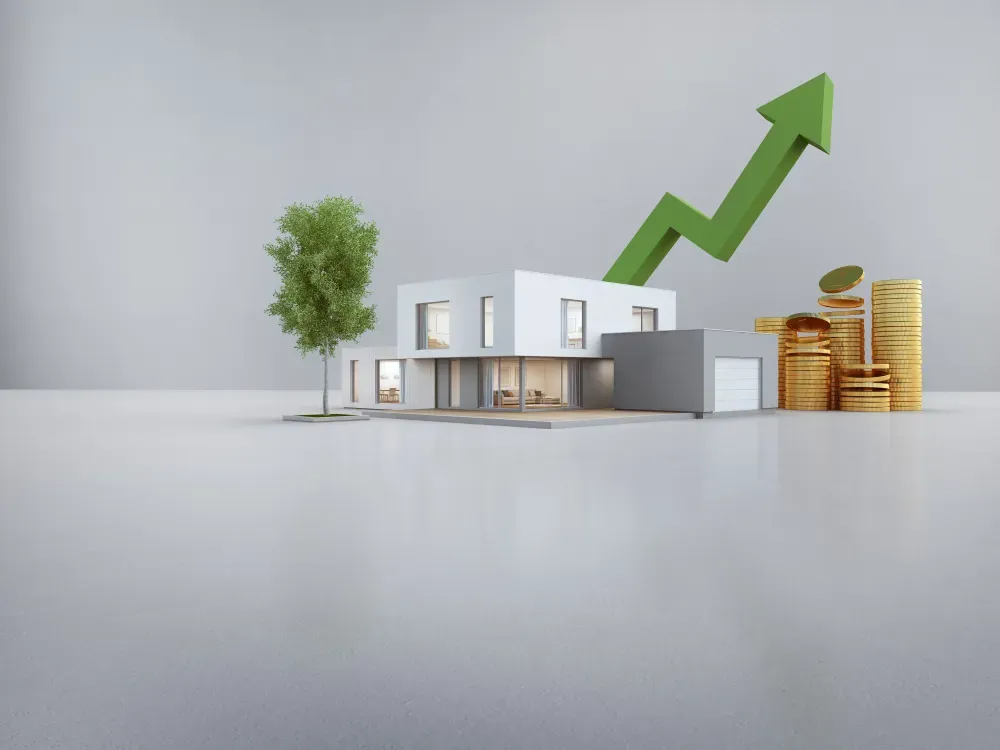The Economics of Real Estate: Understanding the Las Vegas NV Market
Introduction: A Tale of Two Houses
Let me tell you about my friends, Sarah and Mike. Both were looking to buy homes in Las Vegas last year. Sarah jumped in early, snagging a cozy three-bedroom house in Summerlin for $400,000. Mike, on the other hand, waited, hoping prices would drop. Six months later, he ended up paying $450,000 for a similar home in the same neighborhood.
What happened? Well, that's the fascinating world of real estate economics at play. As a real estate agent in Las Vegas, I've seen firsthand how market forces can dramatically impact home prices and investment decisions. In this article, I'll break down the key factors that influence our local real estate market and help you navigate this complex landscape.

Setting the Stage: Las Vegas Real Estate Landscape
Las Vegas isn't just about casinos and shows. It's a vibrant city with a dynamic real estate market that's been on a roller coaster ride over the past few decades. From the housing boom of the early 2000s to the crash in 2008 and the subsequent recovery, our market has seen it all. Today, we're facing new challenges and opportunities that make understanding real estate economics more crucial than ever.
Real Estate Market Analysis: Decoding Las Vegas Trends
To make informed decisions in real estate, whether you're buying, selling, or investing, you need to understand market trends. Let's dive into some key indicators and historical performance of the Las Vegas market.
Key Indicators of Market Health
- Median Home Prices: As of 2024, the median home price in Las Vegas hovers around $400,000. This figure has been steadily climbing over the past few years, reflecting strong demand and limited supply.
- Days on Market: This metric tells us how quickly homes are selling. In hot markets, homes might sell in just a few days. Currently, the average time on market in Las Vegas is about 30 days, indicating a balanced market.
- Inventory Levels: This refers to the number of homes available for sale. Low inventory often leads to price increases as buyers compete for limited options.
- Price per Square Foot: This helps compare homes of different sizes. In Las Vegas, the average price per square foot is around $200, but this can vary significantly by neighborhood.
- Rental Yields: For investors, this indicates the potential return on investment from rental properties. Las Vegas has been known for strong rental yields, often exceeding 6%.
Historical Market Performance in Las Vegas
Las Vegas has seen its fair share of ups and downs. Let's take a quick trip down memory lane:
Boom and Bust Cycles
- Early 2000s: The market experienced rapid growth, with home prices nearly doubling between 2000 and 2006.
- 2008 Financial Crisis: Las Vegas was hit hard, with home values plummeting by over 60% in some areas.
- 2010-2019: A slow but steady recovery took place, with prices gradually climbing back to pre-crisis levels.
- 2020-Present: Despite initial concerns during the pandemic, the market has shown resilience, with prices continuing to rise due to low interest rates and increased demand for suburban living.
Understanding these historical trends can help us anticipate future market movements and make more informed decisions.
Property Valuation Trends: What Determines a Home's Worth?
When it comes to property values in Las Vegas, several factors come into play. Let's explore what makes some homes more valuable than others.
Location, Location, Location: The Golden Rule
It's not just a cliché – location really is everything in real estate. In Las Vegas, some of the most desirable areas include:
- Summerlin: Known for its master-planned communities and excellent schools
- Henderson: Offering a suburban feel with easy access to the Strip
- Downtown Las Vegas: Attracting young professionals with its urban vibe and growing tech scene
Homes in these areas often command premium prices due to their desirable locations.
Home Features That Add Value
Beyond location, certain features can significantly boost a home's value:
- Updated kitchens and bathrooms
- Open floor plans
- Outdoor living spaces (especially important in our desert climate)
- Smart home technology
- Energy-efficient appliances and systems
Energy Efficiency: A Growing Trend
In the Las Vegas heat, energy efficiency isn't just good for the environment – it's good for your wallet too. Homes with features like:
- Solar panels
- Double-pane windows
- High-efficiency HVAC systems
are increasingly desirable and can command higher prices. As an added bonus, these features can help you save on utility bills in the long run.
Housing Supply and Demand: The Balancing Act
The interplay between supply and demand is at the heart of real estate economics. In Las Vegas, this balance has been shifting in recent years.
Population Growth and Housing Needs
Las Vegas has been one of the fastest-growing cities in the U.S. for several years. This growth has put pressure on our housing market:
- Population Influx: Many people are moving to Las Vegas from more expensive cities, attracted by our lower cost of living and no state income tax.
- Job Market: The diversification of our economy beyond tourism has created new job opportunities, drawing more residents.
- Housing Shortage: Despite new construction, we're still playing catch-up to meet the housing needs of our growing population.
New Construction vs. Existing Homes
The balance between new construction and existing homes plays a crucial role in our market:
- New Construction: Builders are working to meet demand, but factors like land availability, construction costs, and labor shortages can limit supply.
- Existing Homes: The resale market remains strong, with many buyers preferring established neighborhoods.
The Impact of Short-Term Rentals
The rise of platforms like Airbnb has introduced a new factor in our housing market:
- Some investors are buying properties specifically for short-term rentals, reducing the supply of long-term housing.
- This can drive up prices in popular tourist areas.
- However, recent regulations have aimed to balance the benefits of the sharing economy with the needs of long-term residents.
Real Estate Investment Economics: Building Wealth Through Property
Real estate has long been a popular investment strategy, and Las Vegas offers unique opportunities in this arena.
Rental Income Potential in Las Vegas
With our strong tourism industry and growing population, Las Vegas can be a great place for rental property investments:
- Long-term Rentals: The influx of new residents creates steady demand for rental homes.
- Short-term Rentals: Our tourism industry supports a robust market for vacation rentals, though it's important to be aware of local regulations.
Key areas for rental investments include:
- Near the Strip for short-term rentals
- Henderson and Summerlin for long-term family rentals
- Downtown for young professional renters
Flipping Houses: Risks and Rewards
House flipping – buying, renovating, and quickly reselling for a profit – can be lucrative in Las Vegas, but it's not without risks:
Pros:
- Potential for quick profits in a rising market
- Opportunity to add value through renovations
Cons:
- Market fluctuations can eat into profits
- Unexpected renovation costs can blow budgets
- Competition from other flippers can drive up purchase prices
Long-Term Appreciation Strategies
For those with patience, long-term property investment in Las Vegas can pay off:
- Buy and Hold: Purchase properties in up-and-coming areas and wait for values to increase.
- Value-Add Investments: Buy properties that need work, improve them over time, and benefit from both forced appreciation and market growth.
- 1031 Exchanges: Use this tax strategy to defer capital gains taxes when selling one investment property and buying another.
Mortgage Interest Rate Impact: How Rates Affect Buying Power
Interest rates play a crucial role in real estate economics, affecting both buyers' purchasing power and overall market dynamics.
The Federal Reserve's Role
The Federal Reserve doesn't directly set mortgage rates, but its policies influence them:
- When the Fed raises its benchmark rate, mortgage rates tend to follow.
- Lower rates generally stimulate buying activity, while higher rates can cool the market.
Fixed vs. Adjustable Rate Mortgages
Understanding different mortgage types can help you make the best decision for your situation:
Fixed Rate Mortgages:
- Interest rate remains the same for the life of the loan
- Provides stability and predictability in monthly payments
- Often a good choice when rates are low
Adjustable Rate Mortgages (ARMs):
- Start with a lower rate that can change over time
- Can be beneficial if you plan to sell or refinance within a few years
- Carry more risk if rates rise significantly
Strategies for Securing the Best Rates
- Improve your credit score before applying for a mortgage
- Shop around with multiple lenders
- Consider buying points to lower your rate
- Keep an eye on economic news that might impact rates
- Be ready to lock in a rate when they're favorable
Conclusion: Navigating the Las Vegas Real Estate Market
The Las Vegas real estate market offers exciting opportunities, but it's important to approach it with knowledge and strategy. By understanding the economics at play – from supply and demand dynamics to the impact of interest rates – you can make more informed decisions whether you're buying a home, investing in property, or simply trying to build long-term wealth.
Remember, real estate is typically a long-term game. While short-term fluctuations can be nerve-wracking, historically, real estate has proven to be a solid investment over time. As we've seen in Las Vegas, markets can change quickly, but they also tend to recover and grow over the long haul.
If you're considering entering the Las Vegas real estate market, don't hesitate to reach out to a local expert. We can provide personalized advice based on your specific situation and goals. After all, in the dynamic world of real estate economics, local knowledge can make all the difference.
FAQ: Common Questions About Real Estate Economics in Las Vegas
- Q: Is now a good time to buy in Las Vegas? A: The best time to buy depends on your personal circumstances. However, with steady population growth and a diversifying economy, Las Vegas continues to offer good opportunities for homebuyers and investors.
- Q: How much do I need for a down payment in Las Vegas? A: While 20% is traditional, many buyers put down less. FHA loans can require as little as 3.5% down, and some conventional loans offer options with 3-5% down payments.
- Q: Are property taxes high in Las Vegas? A: Nevada actually has relatively low property taxes compared to many other states. The average effective property tax rate in Clark County (where Las Vegas is located) is around 0.65%.
- Q: How has the short-term rental market affected Las Vegas real estate? A: Short-term rentals have increased demand in certain areas, potentially driving up prices. However, recent regulations have aimed to balance this market with the needs of long-term residents.
- Q: What areas of Las Vegas are best for investment properties? A: This depends on your investment strategy, but areas like Downtown, the Strip, Summerlin, and Henderson often offer good potential for different types of real estate investments.
Remember, while this information provides a general overview, real estate decisions should be made based on your individual circumstances and goals. For personalized advice, don't hesitate to contact a local real estate professional.
Key Takeaways:
- Las Vegas real estate has shown resilience and growth despite past market fluctuations.
- Location remains a crucial factor in property valuation, with areas like Summerlin and Henderson being highly desirable.
- The balance of housing supply and demand is influenced by population growth, new construction, and factors like short-term rentals.
- Real estate investment in Las Vegas offers various strategies, from rental properties to house flipping and long-term appreciation.
- Understanding mortgage rates and types can significantly impact your buying power and investment returns.
| Factor | Impact on Las Vegas Real Estate |
|---|---|
| Population Growth | Increases demand for housing |
| Job Market Diversification | Attracts new residents, boosts demand |
| Tourism Industry | Supports short-term rental market |
| Interest Rates | Affects buying power and investment decisions |
| New Construction | Helps meet demand, but faces challenges |
Whether you're a first-time homebuyer, a seasoned investor, or simply curious about the Las Vegas real estate market, understanding these economic factors can help you navigate our unique and exciting market. For more information about buying or selling in Las Vegas, check out our services page or learn more about us.


















